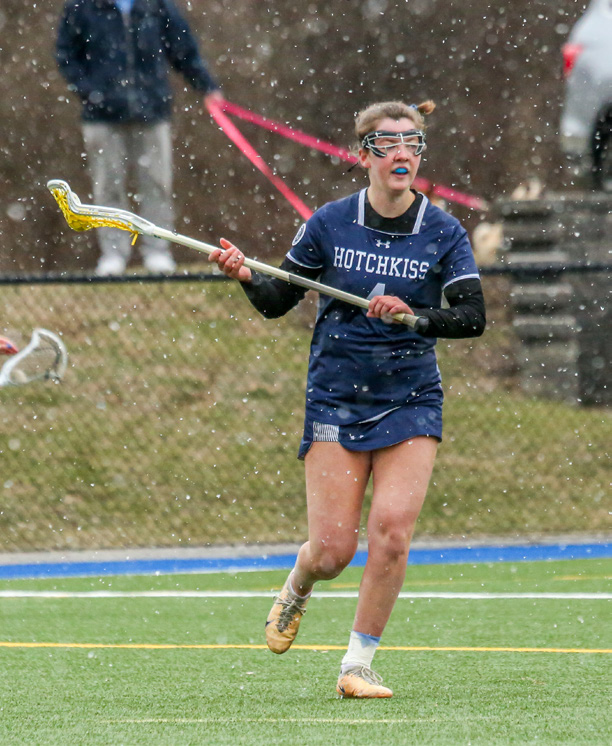OPINION
If you look up The Hotchkiss School on Google, the link that pops up reads: “Home—Connecticut boarding School | Hotchkiss.” It’s an accurate title; we are primarily a boarding school.
Roughly 95% of our student body lives on campus. But hidden amongst throngs of boarders are the 5%—40 odd-day students who navigate a critically different Hotchkiss experience.
Even within the minority that is the day student population, there is still a smaller subset: faculty children. Both of my parents work at the school, and I have lived here my whole life. The school has been deeply ingrained in my identity since childhood.
My orientation week was different from most. My “long-awaited tour” was just another walk around campus and school trivia felt like common knowledge.
My familiarity with the school eased the burden of adjusting to a new place, but my status as a day student created new burdens.
There is an entire community formed in the dorms through daily interactions in the common room, hallways, and bedrooms. After a full day of classes, sports, clubs, and study hall, the time after check-in is prime time to forge relationships. It is then that students form countless moments that sow the seeds of friendship.
The problem? Day students don’t get to participate. For me, check-in during my Prep and Lower Mid years was not a time to start socializing but a time to leave, a daily reminder that I was not the same as everyone else. Although my isolation during the first semester of Prep year was largely a product of not really putting myself out there, it was exacerbated by not having the chances to connect with my peers that full dorm life offered.
This school year, however, began a new chapter of my Hotchkiss life. As an Upper Mid, I accomplished one of my biggest goals: serving as a proctor in Memorial. My desire to be a proctor began when I was a young kid living in Garland. Each year, I was embraced by a new group of proctors who helped make my experience as a faculty child great. The day I received my proctorship acceptance was one of the best days of my Hotchkiss career; it was the euphoric realization of a long-held dream.
I have enjoyed everything that comes with being a proctor. I have the ability to sleep in the dorm as many nights as I want, which I have taken complete advantage of. With this opportunity, I have built stronger connections with my classmates and faculty. For the first time, I feel like I am truly part of a dorm.
So, I applied for proctorship again for my Senior year. I put my all into the application process—writing and revising until I was happy with my answers, reaching out to faculty who knew me well to give recommendations. As decision day approached, I felt confident. The conversations I had with friends were not about if but where we would proctor, as we debated the pros and cons of each dorm. Decision night arrived, and my anxiety crescendoed until at last, the email arrived.
Only, it was not the news I was expecting. It was not a dorm assignment for next year; it was this message: “I regret to inform you that we are unable to offer you a position as a proctor at this time. Due to enrollment projections for next year, we do not have available rooms to house day students.”
A whirlwind of confusion ensued as I—and my day student friends—tried to come to terms with this revelation. The email also left us with many unanswered questions. Would we have a room in the dorm next year? Were day doubles gone too? Was this change permanent or just for next year?
Several weeks later, I’m still confused and growing increasingly concerned. Barring day students from proctorship further widens the gap that already exists between their experience and that of boarding students.
Proctorship is a great honor. It demonstrates a high level of trust and faith from the faculty. It is a role that lets you grow as a leader, communicator, and listener. Already deprived of many elements of the dorm experience, day students are now excluded also from one of the school’s highest leadership positions.
We have been rejected from proctorship not because we lack merit, but due to a part of our identity that we cannot control. The possibility of proctorship helps recruit day students to the school. For me, knowing I could be a proctor was the cherry on top when I was thinking about coming to Hotchkiss. I know that’s true for many other day students as well. Now, that chance is gone.
I sincerely hope that the decision to bar day students from proctorship is just a one-year blip, the result of unforeseen circumstances. But if it is not, it builds another wall between day students and their peers. It pushes day students away from the community by denying them opportunities others have. As someone whose sibling is coming here next year, I truly hope that this is not the reality he has to live with.






